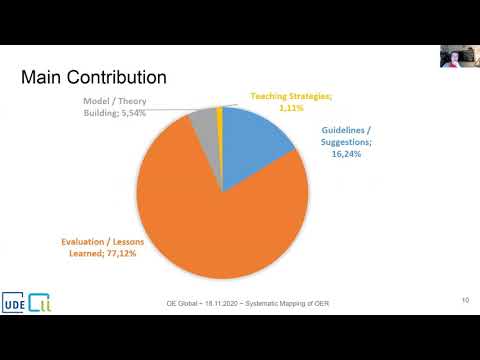Authors: Daniel Otto, Daniel Diekmann, Nadine Schroeder, Pia Sander
Institution: University of Duisburg-Essen
Country: Germany
Topic: Applications of Open Education Practices/Open Pedagogy/Open Education Research
Sector: Higher Education
UNESCO Area of Focus: Building capacity
Session Format: Presentation
Abstract
Ever since their first appearance in 2012, the idea of Open Educational Resources (OER) has gained prominence in education. Consequently, a strong foundation has emerged regarding OER as an opportunity to enhance educational equity and reduce inequalities through broadening access to education. This thrust is also visible in the incremental research output over the years. Besides, several spin-offs have developed that built on OER such as Open Educational Practices (OEP) or OER-enabled pedagogy. However, a glance at the research literature suggests that OER is primarily solid on a conceptual level. At the same time, there is a lack of robust empirical studies that corroborate these conceptual assumptions. Even though certain meta-analysis and systematic reviews of the empirical literature exist, these are often related to specific research questions. Remarkable, even after almost 20 years since the emergence of OER, there are no systematic studies available that provide an overview of the empirical research on OER. However, this lack is also due to the fact that research on OER occurs in various disciplines and across all the different educational areas. In our presentation, we address this lack by presenting findings of a systematic mapping study of empirical research on OER from 2015 to 2019. Thereby we map the international landscape on empirical OER research and reveal trends, gaps and perspective for further research. The systematic mapping approach, in contrast to systematic reviews, claims to present an overview of a research field in its total extensiveness. Thus, systematic mapping studies are suitable for research areas such as OER, which are fuzzy and thus very difficult to grasp. Our systematic mapping study comprises an analysis of empirical studies on OER which were published in the English-language and are referenced in the databases of Web of Science, Scopus and ERIC for the years 2015-2019. A total of 550 studies were systematically mapped using various criteria such as research methodology, research discipline and research results. Our findings of the systematic mapping show that empirical research is mainly conducted in the educational area of the higher education sector while few studies are available for other educational areas. In terms of methods, quantitative studies are prevalent, which are predominantly conducted based on surveys, followed by mixed-method approaches. The primary research interest of the empirical studies is on the perception of OER and barriers to their use in educational practices. Another dominant field of research is Open Textbooks and the analysis of their cost advantages or qualitative comparability with closed educational material. These studies are predominantly carried out in the United States. Research desiderata lie in the little-studied field of the usability or user-friendliness of OER repositories in which OER is made available. Further research gaps can be found regarding the effects of OER on pedagogy and particularly how using OER affects established educational practices. Also, studies on OER related topics such as open pedagogy, there are hardly any empirical studies available.Keywords
Open Educational Resources, Open Educational Practices, Open Pedagogy, Systematic Mapping, Study
